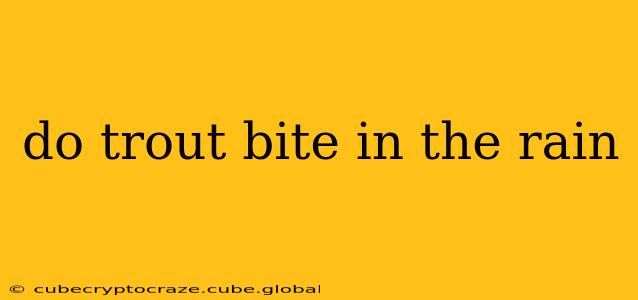Do Trout Bite in the Rain? Unpacking the Rainy Day Fishing Forecast
The question of whether trout bite in the rain is a common one among anglers. The answer, however, isn't a simple yes or no. While rain can negatively impact fishing in some situations, it can actually improve fishing conditions for trout in others. Let's delve into the nuances of this fascinating topic.
Understanding Trout Behavior in Rainy Conditions
Trout are sensitive creatures, and their feeding habits are significantly influenced by their environment. Rain introduces several changes that can affect their activity levels and appetite:
-
Increased Water Levels: Rain often leads to swollen rivers and streams. This increased water flow can dislodge insects and other food sources from the riverbanks, making them more readily available to trout. The higher water levels can also provide trout with more cover and ambush points, making them more likely to strike at passing prey.
-
Muddy Water: Heavy rainfall can make the water murkier, reducing visibility. This can initially suppress trout feeding, as they rely on sight to hunt. However, once the initial surge of sediment settles, the slightly disoriented prey becomes easier targets for the trout.
-
Temperature Changes: Rain can lower water temperature, a factor that significantly impacts trout metabolism. Colder water generally slows their metabolism, potentially reducing their feeding activity. However, a slight drop in temperature after a hot spell can actually stimulate feeding, as the cooler water makes them more comfortable.
-
Insect Activity: Rain can influence insect activity. While heavy downpours might reduce the number of insects on the surface, a light rain can actually drive insects into the water, creating a feast for hungry trout.
Do trout bite better in light rain or heavy rain?
Generally, trout tend to bite better in light to moderate rain. Heavy downpours can create too much disturbance in the water, making it difficult for them to feed effectively. The increased turbidity also reduces their hunting efficiency. Light rain, on the other hand, often leads to increased insect activity and a more favorable feeding environment.
What are the best lures or bait to use when fishing for trout in the rain?
The best approach depends on the water conditions. In clearer water with light rain, dry flies or brightly colored lures can be effective. In murkier water, darker colored lures or bait that create more vibration or scent trails may be more appealing to trout. Consider using lures that mimic the insects most likely to be washed into the water by the rain.
How does rain affect different types of trout?
While the general principles remain consistent, different trout species might exhibit slightly varying responses to rain. For instance, some species might be more tolerant of murky water than others. Researching the specific species you're targeting will provide a more nuanced understanding of their behavior in rainy conditions.
Should I fish for trout in a thunderstorm?
Absolutely not. Your safety should always be the priority. Thunderstorms pose significant risks, including lightning strikes and flash floods. It's best to postpone your fishing trip until the weather improves.
Conclusion:
Rain's impact on trout fishing is complex and dependent on various factors. While heavy rain can negatively affect feeding activity, light to moderate rain can actually create ideal conditions for trout. By understanding these dynamics, anglers can improve their chances of success even on rainy days. Remember to always prioritize safety and adjust your techniques based on the specific weather conditions and the type of trout you are targeting.
